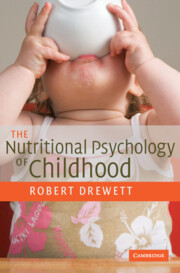Book contents
- Frontmatter
- Contents
- List of illustrations and table
- Preface
- 1 Introduction
- 2 The development of feeding behaviour: infancy
- 3 The development of feeding behaviour: weaning onwards
- 4 Born too small or born too soon
- 5 Nutritional deficiencies
- 6 Nutritional aspects of some physical conditions
- 7 Failure to thrive
- 8 Adiposity and obesity
- 9 Adolescence and the eating disorders
- 10 Some concluding thoughts
- References
- Index
10 - Some concluding thoughts
Published online by Cambridge University Press: 22 September 2009
- Frontmatter
- Contents
- List of illustrations and table
- Preface
- 1 Introduction
- 2 The development of feeding behaviour: infancy
- 3 The development of feeding behaviour: weaning onwards
- 4 Born too small or born too soon
- 5 Nutritional deficiencies
- 6 Nutritional aspects of some physical conditions
- 7 Failure to thrive
- 8 Adiposity and obesity
- 9 Adolescence and the eating disorders
- 10 Some concluding thoughts
- References
- Index
Summary
A woman in Madrid called the emergency services because her child wasn't eating his yoghurt (Corral, 2004). A father suffered a panic attack after accidentally giving his 11-month-old daughter a fruit smoothie that contained a tiny proportion of honey (Wilson, 2005). I dare say these are extreme cases, but parents do seem to show a remarkable degree of anxiety over the feeding and nutrition of their children, and not only parents. According to one recent report, poor nutrition may cause dyslexia, dyspraxia, autism, learning difficulties, irritability, anxiety, lethargy, insomnia, tiredness, depression, anti-social behaviour, reduced sense of smell and taste, cravings, mood swings, hyperactivity, poor concentration and tantrums (Purvis, 2005).
If only one thing is clear from this book, I hope it will be clear quite how difficult a task it would be to investigate all these possibilities. Effects of the principal known nutritional deficiencies on intellectual development in children have been of interest for at least 50 years, but it is very hard to be certain even of the significance of these. Iron deficiency is measurable and much of the biochemistry of iron is quite well understood. There are large numbers of iron-deficient children, and the prevention and treatment of iron deficiency is possible in principle, using procedures that are cheap and relatively safe, and can be implemented in double-blind trials so that investigators can test the children without knowing whether they have been given iron supplements or not.
- Type
- Chapter
- Information
- The Nutritional Psychology of Childhood , pp. 214 - 220Publisher: Cambridge University PressPrint publication year: 2007

